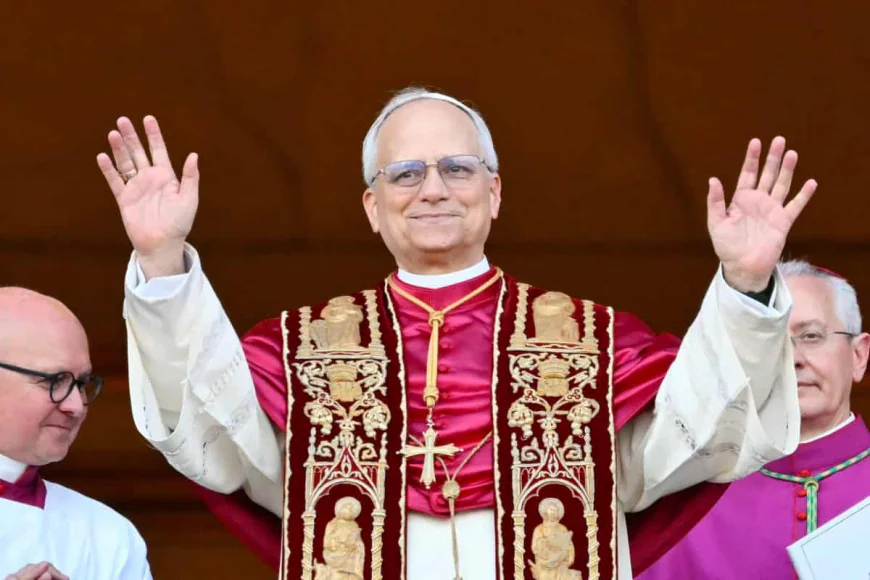Pope Leo XIV: The First American Pope and His Vision for the Catholic Church
Pope Leo XIV, the first American pope, brings a vision blending social justice, synodality, and tradition to the Catholic Church. Elected in 2025, he focuses on labor rights, ecological ethics, and global peace, while navigating challenges like abuse reforms and Church polarization. His leadership marks a historic shift for the Church in the modern era.

On May 8, 2025, the Catholic Church witnessed a historic moment as Robert Francis Prevost, an Augustinian friar and former Bishop of Chiclayo, Peru, was elected Pope Leo XIV—the first pope from North America and only the second from the Americas. His election marks a significant shift in the Church’s leadership, blending traditional values with a commitment to social justice, synodality, and global engagement.
Choosing the name Leo XIV in honor of Pope Leo XIII—the architect of modern Catholic social teaching—he signals a focus on labor rights, economic justice, and ethical responses to technological change. This article explores his background, key beliefs, and the challenges and opportunities facing his papacy.
Early Life and Path to the Papacy
From Chicago to the Vatican
Born in Chicago, Illinois, in 1955, Robert Prevost grew up in a devout Catholic family with Creole and European roots. Drawn to the priesthood from a young age, he joined the Order of Saint Augustine, earning degrees in mathematics, theology, and canon law. His early missionary work in Peru shaped his pastoral approach, exposing him to poverty, political violence, and human rights struggles.
Leadership in the Augustinian Order
As Prior General (2001–2013), he modernized the Augustinians, emphasizing global missions and vocations. Later, as Bishop of Chiclayo (2015–2023), he tackled corruption, ecological crises, and clerical abuse scandals, earning both praise and controversy.
Rise Under Pope Francis
Pope Francis appointed him Prefect of the Dicastery for Bishops (2023–2025), overseeing bishop appointments worldwide. His elevation to cardinal in 2023 positioned him as a leading papal candidate, culminating in his election as Leo XIV in 2025.
Key Beliefs and Priorities
1. Synodality and Church Reform
Leo XIV strongly supports Pope Francis’s synodal vision, promoting greater lay involvement and decentralized decision-making. He believes the Church must listen to the faithful while maintaining doctrinal clarity.
2. Social Justice and Labor Rights
Inspired by Leo XIII’s Rerum Novarum, he advocates for:
-
Fair wages and workers' rights
-
Climate action and sustainable development
-
Protection of migrants and refugees
3. Women in the Church
While opposing female priesthood, he supports:
-
Expanding roles for women in governance (e.g., diocesan councils)
-
Studying the female diaconate
-
Including women in Vatican departments
4. Liturgical Tradition and Modernity
Unlike Pope Francis, he has embraced traditional papal vestments and symbols, suggesting a balance between reform and continuity.
5. Global Conflicts and Peacebuilding
His early speeches called for:
-
Ceasefires in Ukraine and Gaza
-
Dialogue over militarization
-
Church-led humanitarian efforts
Controversies and Challenges
Allegations of Abuse Cover-Ups
Critics accuse him of insufficient action against abusive priests in Peru. Supporters argue he followed canonical procedures and supported victims.
Resistance from Conservatives
Some traditionalists oppose his synodal approach, fearing doctrinal dilution. Meanwhile, progressives want faster reforms on issues like LGBTQ+ inclusion.
Navigating U.S. Politics
As the first American pope, he faces scrutiny over Church-state relations, especially regarding U.S. immigration policies and social divisions.
What to Expect from His Papacy
Leo XIV’s leadership will likely focus on:
-
Strengthening Catholic social teaching in an era of AI and economic inequality.
-
Balancing reform and tradition amid Church polarization.
-
Expanding the Church’s role in peacemaking amid global conflicts.
His multilingual skills, pastoral experience, and diplomatic tone position him as a unifying figure, though challenges remain.
Conclusion
Pope Leo XIV’s election marks a new chapter for the Catholic Church—one that bridges continents, traditions, and modern challenges. With a deep commitment to social justice, synodality, and ethical leadership, his papacy could shape the Church’s direction for decades.
What do you think of Pope Leo XIV’s vision? Share your thoughts below!















































